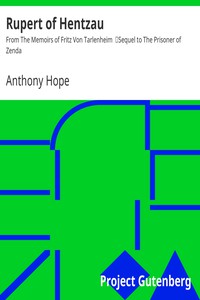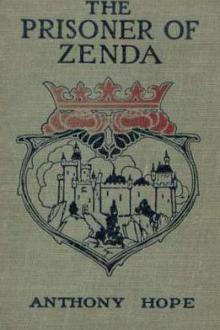Rupert of Hentzau: From The Memoirs of Fritz Von Tarlenheim<br />Sequel to The Prisoner of Zenda, Anthony Hope [top 10 most read books in the world TXT] 📗

- Author: Anthony Hope
Book online «Rupert of Hentzau: From The Memoirs of Fritz Von Tarlenheim<br />Sequel to The Prisoner of Zenda, Anthony Hope [top 10 most read books in the world TXT] 📗». Author Anthony Hope
“I’ll be there in case—but I think Rischenheim will stop him.”
“If he comes here?”
“Young Bernenstein will die before he suffers him to reach the king.”
“Sapt!”
“Ay?”
“Be kind to her.”
“Bless the man, yes!”
“Good-by.”
“And good luck.”
At a swift canter Rudolf darted round the drive that led from the stables, by the moat, to the old forest road behind; five minutes brought him within the shelter of the trees, and he rode on confidently, meeting nobody, save here and there a yokel, who, seeing a man ride hard with his head averted, took no more notice of him than to wish that he himself could ride abroad instead of being bound to work. Thus Rudolf Rassendyll set out again for the walls of Strelsau, through the forest of Zenda. And ahead of him, with an hour’s start, galloped the Count of Luzau-Rischenheim, again a man, and a man with resolution, resentment, and revenge in his heart.
The game was afoot now; who could tell the issue of it?
CHAPTER VII. THE MESSAGE OF SIMON THE HUNTSMAN
I RECEIVED the telegram sent to me by the Constable of Zenda at my own house in Strelsau about one o’clock. It is needless to say that I made immediate preparations to obey his summons. My wife indeed protested—and I must admit with some show of reason—that I was unfit to endure further fatigues, and that my bed was the only proper place for me. I could not listen; and James, Mr. Rassendyll’s servant, being informed of the summons, was at my elbow with a card of the trains from Strelsau to Zenda, without waiting for any order from me. I had talked to this man in the course of our journey, and discovered that he had been in the service of Lord Topham, formerly British Ambassador to the Court of Ruritania. How far he was acquainted with the secrets of his present master, I did not know, but his familiarity with the city and the country made him of great use to me. We discovered, to our annoyance, that no train left till four o’clock, and then only a slow one; the result was that we could not arrive at the castle till past six o’clock. This hour was not absolutely too late, but I was of course eager to be on the scene of action as early as possible.
“You’d better see if you can get a special, my lord,” James suggested; “I’ll run on to the station and arrange about it.”
I agreed. Since I was known to be often employed in the king’s service, I could take a special train without exciting remark. James set out, and about a quarter of an hour later I got into my carriage to drive to the station. Just as the horses were about to start, however, the butler approached me.
“I beg your pardon, my lord,” said he, “but Bauer didn’t return with your lordship. Is he coming back?”
“No,” said I. “Bauer was grossly impertinent on the journey, and I dismissed him.”
“Those foreign men are never to be trusted, my lord. And your lordship’s bag?”
“What, hasn’t it come?” I cried. “I told him to send it.”
“It’s not arrived, my lord.”
“Can the rogue have stolen it?” I exclaimed indignantly.
“If your lordship wishes it, I will mention the matter to the police.”
I appeared to consider this proposal.
“Wait till I come back,” I ended by saying. “The bag may come, and I have no reason to doubt the fellow’s honesty.”
This, I thought, would be the end of my connection with Master Bauer. He had served Rupert’s turn, and would now disappear from the scene. Indeed it may be that Rupert would have liked to dispense with further aid from him; but he had few whom he could trust, and was compelled to employ those few more than once. At any rate he had not done with Bauer, and I very soon received proof of the fact. My house is a couple of miles from the station, and we have to pass through a considerable part of the old town, where the streets are narrow and tortuous and progress necessarily slow. We had just entered the Konigstrasse (and it must be remembered that I had at that time no reason for attaching any special significance to this locality), and were waiting impatiently for a heavy dray to move out of our path, when my coachman, who had overheard the butler’s conversation with me, leant down from his box with an air of lively excitement.
“My lord,” he cried, “there’s Bauer—there, passing the butcher’s shop!”
I sprang up in the carriage; the man’s back was towards me, and he was threading his way through the people with a quick, stealthy tread. I believe he must have seen me, and was slinking away as fast as he could. I was not sure of him, but the coachman banished my doubt by saying, “It’s Bauer—it’s certainly Bauer, my lord.”
I hardly stayed to form a resolution. If I could catch this fellow or even see where he went, a most important clue as to Rupert’s doings and whereabouts might be put into my hand. I leapt out of the carriage, bidding the man wait, and at once started in pursuit of my former servant. I heard the coachman laugh: he thought, no doubt, that anxiety for the missing bag inspired such eager haste.
The numbers of the houses in the Konigstrasse begin, as anybody familiar with Strelsau will remember, at the end adjoining the station. The street being a long one, intersecting almost the entire length of the old town, I was, when I set out after Bauer, opposite number 300 or thereabouts, and distant nearly three-quarters of a mile from that important number nineteen, towards which Bauer was hurrying like a rabbit to its burrow. I knew nothing and thought nothing of where he was going; to me nineteen was no more than eighteen or twenty; my only desire was to overtake him. I had no clear idea of what I meant to do when I caught him, but I had some hazy notion of intimidating him into giving up his secret by the threat of an accusation of theft. In fact, he had stolen my bag. After him I went; and he knew that I was after him. I saw him turn his face over his shoulder, and then bustle on faster. Neither of us, pursued or pursuer, dared quite to run; as it was, our eager strides and our carelessness of collisions created more than enough attention. But I had one advantage. Most folk in Strelsau knew me, and many got out of my way who were by no means inclined to pay a like civility to Bauer. Thus I began to gain on him, in spite of his haste; I had started fifty yards behind, but as we neared the end of the street and saw the station ahead of us, not more than twenty separated me from





Comments (0)